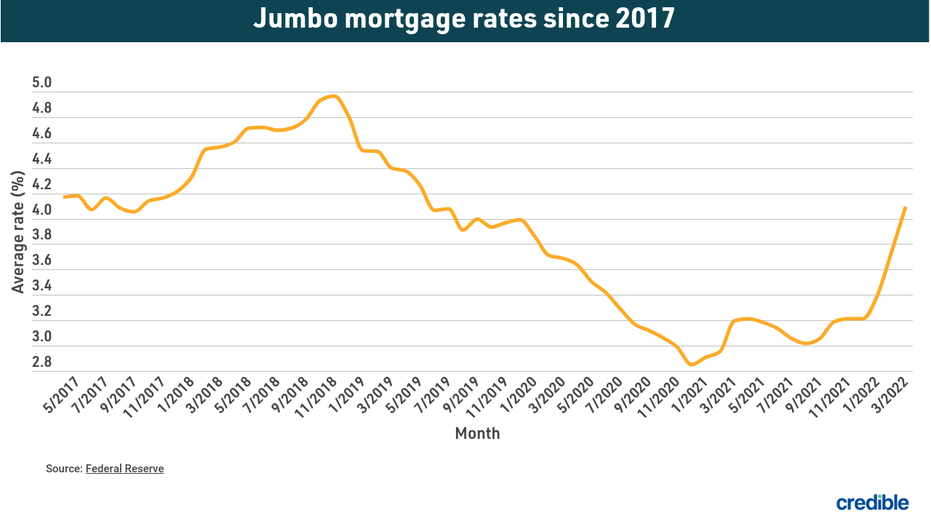The Influence of Jumbo Finances on Your Funding Alternatives: What You Required to Know Prior To Using
Jumbo loans can play a crucial duty fit your financing options, especially when it pertains to getting high-value residential or commercial properties. While they provide the possibility for bigger finance amounts without the worry of private mortgage insurance coverage (PMI), they also come with rigorous qualification standards that need mindful factor to consider. Recognizing the equilibrium between the advantages and challenges presented by these loans is essential for prospective customers. As you evaluate your options, the effects of rates of interest and product schedule might motivate you to reassess your economic method relocating ahead (jumbo loan).
Comprehending Jumbo Lendings
Comprehending Jumbo Loans requires a clear understanding of their one-of-a-kind characteristics and demands. Jumbo fundings are a sort of mortgage that exceeds the adapting loan restrictions developed by the Federal Housing Finance Agency (FHFA) These limits differ by place but commonly cap at $647,200 in a lot of areas, making big fundings important for funding higher-priced residential or commercial properties.
One of the defining features of jumbo finances is that they are not eligible for purchase by Fannie Mae or Freddie Mac, which leads to stricter underwriting standards. Customers should commonly show a greater credit history, normally above 700, and provide considerable documents of revenue and assets. Additionally, lenders might require a bigger deposit-- typically 20% or more-- to minimize threat.
Passion rates on big fundings can be slightly higher than those for adhering finances as a result of the enhanced danger presumed by the loan provider. Nevertheless, the lack of exclusive home loan insurance coverage (PMI) can counter some of these prices. Comprehending these factors is essential for potential debtors, as they significantly influence the terms and expediency of securing a jumbo finance in today's affordable real estate market.
Advantages of Jumbo Financings
Jumbo loans provide distinct benefits for property buyers looking for to acquire high-value buildings that go beyond traditional loan restrictions. One of the key benefits of big fundings is their capability to finance bigger amounts, permitting customers to get homes in premium markets without the restraints enforced by adjusting lending limits - jumbo loan. This versatility allows buyers to view a broader series of buildings that might much better match their preferences and requirements
Additionally, big fundings commonly feature competitive rates of interest, specifically for consumers with strong credit score profiles. This can result in considerable savings over the life of the funding, making homeownership more affordable in the long run. Jumbo finances can be tailored to fit individual financial situations, supplying various terms and amortization options that straighten with the borrower's objectives.

Difficulties of Jumbo Lendings
Browsing the complexities of jumbo finances provides a number of obstacles that possible customers ought to understand before continuing. One considerable hurdle is the stringent lending requirements imposed by financial institutions. Unlike adapting lendings, big fundings are not backed by government-sponsored ventures, leading loan providers to adopt even more strenuous standards. This usually includes higher credit rating score demands and substantial my sources documentation to verify income and assets (jumbo loan).
Furthermore, big car loans typically feature greater interest prices compared to traditional lendings. This raised price can dramatically impact month-to-month repayments and general affordability, making it crucial for borrowers to very carefully evaluate their monetary circumstance. Furthermore, the deposit demands for big financings can be considerable, usually varying from 10% to 20% or even more, which can be a barrier for many potential property owners.
One more challenge exists in the minimal schedule of jumbo financing products, as not all loan providers provide them. This can result in a lowered swimming pool of choices, making it critical for borrowers to conduct complete study and possibly seek specialized lending institutions. Generally, recognizing these difficulties is essential for anyone taking into consideration a big finance, as it ensures enlightened decision-making and better economic preparation.
Qualification Criteria
For those taking into consideration a jumbo lending, satisfying the credentials standards is a vital action in the application process. Unlike traditional finances, big lendings are not backed by government firms, resulting in more stringent demands.
Firstly, a strong credit history is crucial; most lending institutions call for a minimal rating of 700. A greater score not only increases your chances of approval yet might additionally protect much better rate of interest. Additionally, customers are generally expected to demonstrate a substantial income to guarantee they can easily take care of greater regular monthly payments. A debt-to-income (DTI) ratio listed below 43% is generally chosen, with reduced proportions being much more favorable.
Deposit demands for big finances are additionally significant. Borrowers should anticipate putting down at the very least 20% of the building's acquisition price, although some loan providers might offer choices as reduced as 10%. Showing money reserves is important; loan providers usually need proof of adequate liquid possessions to cover numerous months' worth of mortgage payments.
Contrasting Financing Options
When reviewing funding choices for high-value homes, comprehending the differences in between numerous finance types is essential. Jumbo fundings, which exceed adapting lending limits, commonly included stricter certifications and higher passion rates than conventional fundings. These fundings are not backed by government-sponsored enterprises, which raises the lending institution's risk and can result in much more rigorous underwriting standards.
On the other hand, traditional fundings supply more versatility and are commonly less complicated to obtain for consumers with strong credit rating profiles. They might feature reduced rates of interest and a larger variety of choices, such as repaired or adjustable-rate home mortgages. Furthermore, government-backed lendings, like FHA or VA lendings, give possibilities for reduced deposits and more lax credit scores needs, though they also impose limits on the finance amounts.

Conclusion
Finally, jumbo finances present both chances and challenges for possible property buyers looking for financing for high-value homes. While these fundings permit larger amounts without the burden of private mortgage insurance, they feature rigorous certification requirements and prospective disadvantages such as higher rates of interest. A thorough understanding of the benefits and obstacles connected with jumbo fundings is essential for making educated decisions that straighten with long-lasting monetary objectives and objectives in the real estate market.
